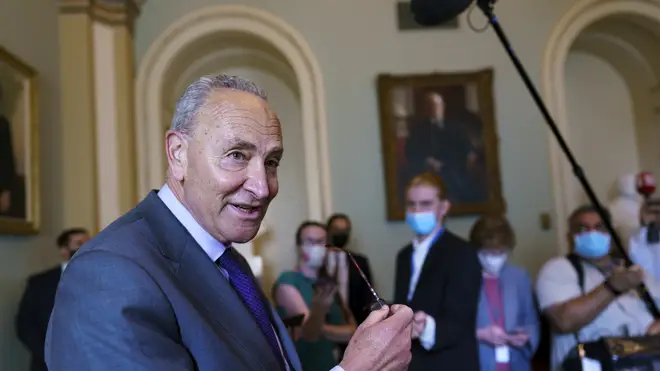
Nick Ferrari 7am - 10am
1 August 2021, 04:14

Senate majority leader Chuck Schumer said work would resume on Sunday.
The US Senate wrapped up a rare Saturday session making little visible progress on the one trillion dollar legislative package, but Senate majority leader Chuck Schumer vowed the work would get done.
The Senate planned to reconvene on Sunday.
Senators and staff have been labouring behind the scenes for days to write what is certain to be a massive piece of legislation.
An early draft swelled beyond 2,500 pages.
To prod the work along, Mr Schumer kept senators in a weekend session, encouraging the authors of a bipartisan infrastructure plan to finish drafting the bill so that senators can begin offering amendments.
Several senators had predicted that the text of the bill would be ready for review late Friday or early Saturday, but it was not done when the Senate opened for business late in the morning. Nor was it ready to be filed when Mr Schumer closed the floor 11 hours later.
“They need a little more time,” Mr Schumer said in the evening.
“I’m prepared to give it to them.”

Mr Schumer said he understood that completing the writing of such a large bill is a difficult project, but he warned that he was prepared to keep politicians in Washington for as long as it took to complete votes on both the bipartisan infrastructure plan and a budget blueprint that would allow the Senate to begin work later this year on a massive, 3.5 trillion US dollar social, health and environmental bill.
”The longer it takes to finish, the longer we will be here, but we’re going to get the job done,” he said.
The bipartisan plan calls for 550 billion US dollars in new spending over five years above projected federal levels.
A draft bill circulating Capitol Hill indicated it could have more than 2,500 pages when introduced.
It is being financed from funding sources that might not pass muster with deficit hawks, including repurposing untapped Covid-19 relief aid and relying on projected future economic growth.
Among the major investments are 110 billion US dollars for roads and bridges, 39 billion US dollars for public transport and 66 billion US dollars for rail.
There is also 55 billion US dollars for water and wastewater infrastructure as well as billions for airports, ports, broadband internet and electric vehicle charging stations.